- Home
- Ian Buruma
The China Lover Page 2
The China Lover Read online
Page 2
2
I FIRST SAW Yamaguchi Yoshiko perform in the great city of Mukden in October 1933. Mukden, which we called Hoten, was the busiest, most cosmopolitan city in Manchuria, more modern even than Tokyo in its best days, before our capital city was turned into a smoldering ruin by the American B-29s.
It was her eyes that left the deepest impression. They were unusually large for an Oriental woman. She didn’t look typically Japanese, nor typically Chinese. There was something of the Silk Road in her, of the caravans and spice markets of Samarkand. No one would have guessed that she was just an ordinary Japanese girl born in Manchuria.
Before we Japanese arrived, Manchuria was a wild and terrifying place, located perilously in the border areas of Russia and China, which didn’t belong to anyone. Once the seat of the great Qing Dynasty emperors, Manchuria fell on hard times after the emperors had moved south to Peking. Warlords did as they liked, looting this vast region of its treasures, while pitting their bandit armies against one another, causing terrible misery to the impoverished people who were unfortunate enough to get in their way. Women were taken as slaves, and men were killed or forced to join the bandits, who swept through the villages like a swarm of locusts. The poor, long-suffering people of Manchuria ate nothing but bitterness for hundreds of years. Those few brave souls who tried to resist would end up hanging upside down from the trees, their intestines spilling out like broken wires, as terrible examples to others who might have similar ideas. Order was eventually restored, however, and not a minute too soon, when the great state of Manchukuo was founded under our tutelage.
Manchukuo was a truly Asian empire, ruled by the last scion of the Qing Dynasty, Emperor Pu Yi. But it was also a cosmopolitan empire, where all races mixed and were treated equally. Each of the five main races, Japanese, Manchu, Chinese, Korean, and Mongolian, had its own color on the national flag: mustard yellow with stripes of red, white, black, and blue. Then there were Russians, in Harbin, Dairen, and Mukden, and Jews, as well as other foreigners from all corners of the world. Arriving at the port of Dairen, at the southern tip of Manchuria, to me felt like arriving in the great wide world. Even Tokyo felt narrow and provincial in comparison. Cosmopolitanism was in the very air. Apart from coal dust and cooking oil, you could pick up the pungent melange of pickled Korean cabbages, steaming Russian pierogis, barbecued Manchu mutton, Japanese miso soup, and fried Peking dumplings.
And the women! The Mukden women were the most beautiful north of Shanghai: the Chinese girls, lithe and nimble as eels in their tight qi pao dresses; the kimonoed Japanese beauties, perched like finely plumed birds in their rickshaws bound for the teahouses behind the Yokohama Specie Bank; the perfumed Russian and European ladies taking tea at Smirnoff’s in feathered hats and furs. Verily, Mukden was paradise for a young wolf on the loose. Since I was a fit young man, always well turned out, I had no reason to complain of a lack of female attention.
Every autumn since the early 1920s, Madame Ignatieva, who had once sung Madama Butterfly in St. Petersburg for the Czar and Czarina, would perform in the ballroom of the Yamato Hotel, a grand but rather forbidding establishment, whose turrets and castellated walls had the air more of a fortress than a hotel. Madame Ignatieva and her husband, a White Russian nobleman, had fled from the Communists in 1917 and lived in Mukden ever since. The count, always impeccably dressed in his old army uniform complete with the Cross of St. George bestowed on him personally by the Czar, ran a boardinghouse near the railway station.
The highlight of Madame Ignatieva’s artistry was the “Habanera” from Carmen. She also sang arias from Tosca and Madama Butterfly, but Carmen was considered by music lovers to be her finest piece. The hall was packed. The crystal chandeliers cast a sparkling light on the gilded chairs and the medals pinned to long rows of uniformed chests. Everyone of any consequence in Mukden was there, and some people had come down especially from Shinkyo, the capital city of Manchukuo: General Itagaki of the Kanto Army, our garrison force in China, sat in front, with Hashimoto Toranosuke, head Shinto priest of Manchukuo, and Captain Amakasu Masahiko, president of the Japan-Manchukuo Friendship Association. I spotted General Li, chairman of the Shenyang Bank, looking martial in his Kaiser Wilhelm mustache; and Mr. Abraham Kaufman, head of the Jewish community, sitting in the back row, trying to stay out of the way of Konstantin Rodzaevsky, an ill-mannered ruffian who was always pestering us to “clean out” the Jews.
And there, bathed in the spotlight, was the splendid figure of Madame Ignatieva herself, dressed in a long black gown, with a shawl of black lace trailing along the floor. She smiled as she strode to the center of the stage, a red rose in her right hand, her chin held high, acknowledging the applause with curt little nods to all sides, like a haughty pigeon. “Strode” is actually not the right word; she undulated, voluptuously, in the way large Western women do. And right behind her was her star pupil, a sweet young Japanese girl in a long-sleeved purple kimono with a pattern of white cranes. She was like a delicate flower, just before its moment of bloom, radiating a childlike innocence as well as a kind of exotic elegance not normally seen in Japanese girls. Perhaps she was a little nervous, for just as Madame Ignatieva was about to take her place at center stage, the girl stepped on the tip of the long black shawl, stopping her teacher in her tracks. For an instant the smile vanished from Madame Ignatieva’s face, but she immediately recovered and opened her throat for the “Habanera.” The girl’s dark eyes widened as if to plead for our forgiveness and she blushed most prettily.
It was, as I said, those wide eyes that left an indelible impression on me. Though not beautiful in any conventional sense, and rather too large for her small face, almost fishlike even, they nonetheless expressed a delightful vulnerability. There was no more trace of nervousness when she launched into her first song, following the per formance of Madame Ignatieva. I remember “Moonlight at the Ruined Castle,” a Japanese song which made us all weep; then Beethoven’s “Ich Liebe Dich,” then a folk song in Chinese, then a Russian song whose title I can’t remember, and finally a charming rendering of Schubert’s “Serenade.” It was quite clear, even at her tender age, that Yoshiko was not like the provincial warblers who can make concerts in Japan such a torment. Her command of languages and grasp of different national styles was extraordinary. Only the cosmopolitan soil of Manchukuo could have yielded such a treasure. I know it is easy to say in hindsight, but I knew then that Yoshiko, at the tender age of thirteen, was something very special indeed.
Yoshiko was born in 1920. Her father was the kind of adventurer we called tairiku ronin, or continental drifter, a Sinophile who roamed across the Manchurian plains in search of fortune. This, alas, remained elusive. For the most part, he made a precarious living teaching the Chinese language to Japanese employees of the South Manchurian Railway Company. Precarious, that is, not because he was especially poorly paid, but because he had a weakness for gambling. One of his pupils, at one point, was me. Before she was adopted by a Chinese general, Yoshiko lived the typical life of a Japanese child on the continent, mixing freely with children of other races, even as she received the strict education of a proper young Japanese.
The year of Yoshiko’s birth was just a decade before the birth of Manchukuo. Or perhaps one should say just eleven years before the conception of Manchukuo. For this happened with a big bang, on September 13, 1931, when a bomb exploded on the railway tracks just outside Mukden. Quite who the culprits were was not made clear at the time. Let us assume it was from a Sino-Japanese one-night stand that Manchukuo was eventually born. Our Kanto Army quickly secured all the towns along the South Manchurian Railway and the territory was effectively ours—except at night, when local bandits still made a safe passage along the railroad impossible. Less than a year later, the former Manchu kingdom, which had gone rotten like an abandoned old mansion and become a refuge for the worst ruffians in China, became a modern state.
But I’m a romantic, so I prefer an alternative date for the birth of Manchuk
uo. On the dawn of March 1, 1934, Pu Yi, the last scion of the Manchu Dynasty, dressed in the yellow silk robes of his imperial ancestors, prayed to the sun in the garden behind his palace in Shinkyo, and was officially reborn as the Emperor of Manchukuo. The moment he emerged from his audience with the sun, the new state had become an empire. I was obviously not allowed to attend this ceremony, which had to be carried out by him alone. But I shall never forget the sight of Emperor Pu Yi later that day, in his magnificent double-breasted uniform, with gold epaulettes streaming down his narrow but hallowed shoulders and a gold helmet sprouting red-tinted ostrich feathers. The band played the Manchukuo anthem, as the Emperor goose-stepped along a red carpet to his throne, escorted by Prince Chichibu, three officers of the Kanto Army, and ten Manchurian pageboys from a local orphanage. His trousers were too long, his bespectacled head almost disappeared into his feathered helmet, and his goose steps made him look a bit like a puppet on strings. Frankly, the ceremony was not entirely devoid of comedy. And yet there was an unmistakable sense of grandeur about the occasion. People need spectacles to nurture their dreams, give them something to believe in, foster a sense of belonging. The Chinese and Manchu people, demoralized by more than a hundred years of anarchy and Western domination, needed it more than most. And—although people tend to forget this now—we Japanese gave it to them; we gave them something larger than themselves, a great and noble goal to live and die for.
It was altogether a good time to be alive, for those of us who had big dreams for Asia and Manchukuo. It was certainly the best of times for me personally. After years of drifting from job to job—a private teacher in Dairen, a researcher at the Manchurian Railway Company, during which time I studied the Chinese language, and an independent consultant on native affairs to the Military Police in Mukden— I had finally landed the perfect job. Quite frankly, in Japan I had been a failure. I failed as a student of economics in Tokyo, because I barely ever saw the sunlight. My life was spent in the cinemas of Ueno and Asakusa. This is where all my money went. The walls of my tiny room were covered with pictures of my favorite stars, which I stole from the local picture palace at night. I would love to have worked in the movies, even as a humble assistant director. But in Japan you needed connections, and I had none. For who was I? An obscure dreamer from a village in Aomori prefecture.
In Mukden, however, under the auspices of the Kanto Army, I, Sato Daisuke, was able to open my own office: the Sato Special Services Bureau for New Asian Culture. The services I offered were somewhat diverse, and subject to a certain degree of discretion. Let us say my business was information, finding out things, some of them of a delicate political nature. This took a certain theatrical talent. To blend into the local scene, I had to learn how to speak and behave like a local. Luckily I am blessed with an excellent ear. Friends sometimes joked that I was a human parrot. When I’m with a stammerer, I stammer; with someone with a thick Kansai accent, I speak like an Osaka merchant. That is why I picked up Chinese with relative ease, astonishing other Japanese. To my compatriots I remained plain Sato Daisuke, sometimes dressed in Western suits, sometimes in Japanese kimonos, sometimes in a Kanto Army uniform. With the Manchus and Chinese, I was Wang Tai, and I chose the best Chinese clothes, made of the finest silk by the most reputable tailor in Shanghai. Politics was part of my job, but culture was my real domain; and by far the most pleasant task, certainly for me the most important, was to find local talent for Manchukuo broadcasting and motion picture companies. This is how my own modest gifts found their perfect application.
The problem with Japanese entertainment in Manchukuo was not the lack of money or goodwill. Since the picture studios, as well as the broadcasting stations, were funded by the Japanese government, there was plenty of cash to spend on the best equipment money could buy, from Japan, but also from Germany and even the United States. The Manchuria Motion Picture Association had superb studios. And though some of the money (and most of the native actresses) stuck to the hands of Kanto Army officers, there was still plenty to spare for making top-notch films. The Mukden Broadcasting Corporation too was entirely up-to-date, with the latest soundproofed recording studios, some of which had room for an entire symphony orchestra. Artists visiting from Japan could not believe their eyes; they had never seen anything like it. People sometimes forget this when they criticize us for what happened later. But it is a plain fact that in Manchukuo we dragged Asia into the modern world. This enterprise, so often misunderstood, was surely something we can still be proud of.
To raise the morale of the native population and make them understand what we were fighting for, it was no good just shouting the usual slogans about Japanese-Manchukuo friendship. Nor could we hope to appeal to the natives by showing films of Japanese pioneers building schools or designing bridges. These things just bored them to tears. And, frankly, who could blame them? They bored me, too. The Manchu mind was, in any case, much too sophisticated for our regular propaganda, and at the same time almost childlike in its craving for comic entertainment. We needed to enlighten and educate, naturally, but also amuse. We wanted to make good movies; not just good movies, but the best, better than the pictures made in Tokyo, pictures that would embody the spirit of the New Asia. This couldn’t be done without top native performers who could sing and act in Chinese, as well as understand our cause, and speak enough Japanese to communicate with the directors and cameramen, who came from our homeland. Finding such people was my headache, often alleviated, it is true, by the company of some lovely Manchurian actresses, whose talents were estimable, though not always quite what was required by the Mukden Broadcasting Corporation.
The man in charge of our propaganda in Manchukuo was an odd fellow, with a finger in many pies, named Amakasu Masahiko, a captain in the Kanto Army. A born fixer, who knew all the powerful people in Tokyo, Shanghai, and Manchukuo, both respectable and not so respectable, Amakasu was like a spider in a giant web. There was nothing in Manchukuo that escaped his attention: the opium trade went through his office, as did other discreet enterprises necessary for the state to function properly and efficiently. Apart from everything else, Amakasu combined the tasks of supervising the security of Emperor Pu Yi and presiding over various important cultural and political institutions, such as the Shinkyo Symphony Orchestra and the Concordia Association, to promote racial harmony and social order in Manchukuo.
Although he was a figure of great cultural refinement, Amakasu had a somewhat fearsome reputation. Room 202, his suite in the Yamato Hotel in Shinkyo, was guarded day and night by heavily armed soldiers from the Kanto Army. But Amakasu was not a man to leave anything to chance. He always slept with a pistol by his side, a black German Mauser C96. There were many people who would have been happy to see him dead. And even those who would not were afraid of him. The odd thing was that he didn’t look at all imposing. A trim little man with a shaved head, shaped a bit like a peanut, and round tortoise-shell glasses, he rarely smiled and almost never raised his voice above a breathy murmur. To look at him, he could have been an accountant or the manager of a drugstore. But looks are deceiving. Amakasu was feared for good reasons. We all knew that he had spent time in prison back in Japan for murdering a Communist, as well as the Red’s wife and young nephew. Amakasu was a lieutenant in the Kempeitai at the time, our Military Police, and he strangled the entire family with his own bare hands.
A strange bird, as I say. But I liked him. We shared a love of the arts. Amakasu adored classical music and would sit in his room listening to his phonograph for hours on end. And like me, Amakasu was a great reader of All Men Are Brothers; a copy always lay by his bedside, next to his Mauser C96. We sometimes discussed the merits of various heroes. His favorite character was Riki, also known as the Black Whirlwind, the hard-drinking warrior who wielded two axes in battle, and who, rather than live in shame, preferred to commit suicide after his band of brothers was defeated. Like his hero, Amakasu was loyal to his friends and a sincere patriot. What endeared him to me most, howe
ver, was not his patriotism, which I never doubted, but his unfailing courtesy to the native people. Often, when Japanese officials spoke of “harmony among the five races,” they were just mouthing official words. One of the great tragedies of Manchukuo was that those who most loudly proclaimed our ideals so rarely managed to live up to them. But not Captain Amakasu. He really meant it. I have reason to know this from personal experience. Let me relate just one example.
Most of Amakasu’s business was transacted in his hotel suite, but once in a while he would entertain at a Japanese restaurant nearby, called the South Lake Pavilion, a place frequented mostly by Kanto Army officers. I attended a party there in the winter of 1939. It was a bitterly cold night. The streets were frozen solid. Even the slight mist that hung over the city seemed to have hardened into a cloud of pins and needles. A full moon shone through the haze like a milky fluorescent light.

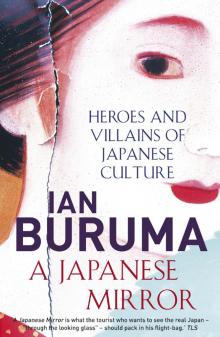 A Japanese Mirror
A Japanese Mirror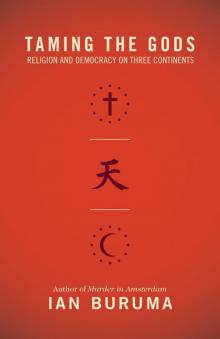 Taming the Gods
Taming the Gods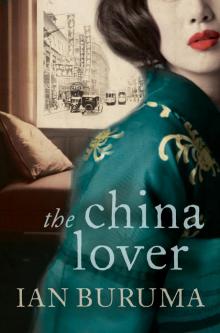 The China Lover
The China Lover A Tokyo Romance
A Tokyo Romance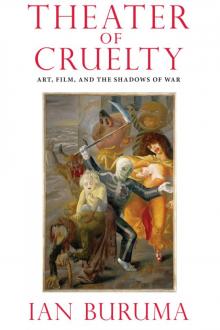 Theater of Cruelty
Theater of Cruelty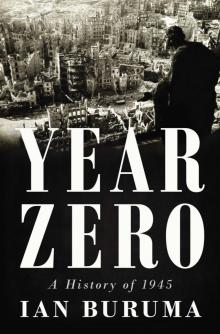 Year Zero
Year Zero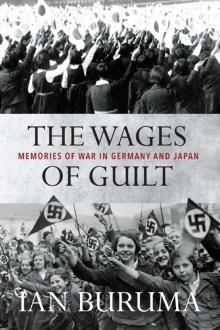 The Wages of Guilt
The Wages of Guilt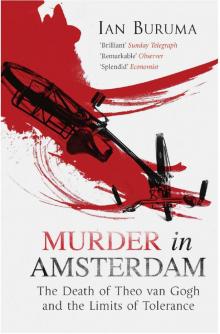 Murder in Amsterdam
Murder in Amsterdam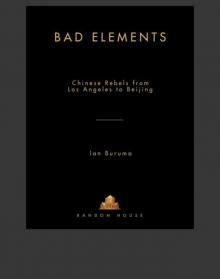 Bad Elements
Bad Elements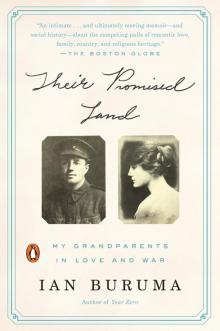 Their Promised Land
Their Promised Land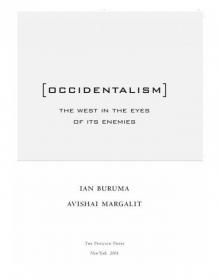 Occidentalism
Occidentalism Anglomania
Anglomania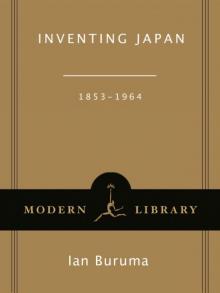 Inventing Japan: 1853-1964 (Modern Library Chronicles)
Inventing Japan: 1853-1964 (Modern Library Chronicles) The Missionary and the Libertine
The Missionary and the Libertine